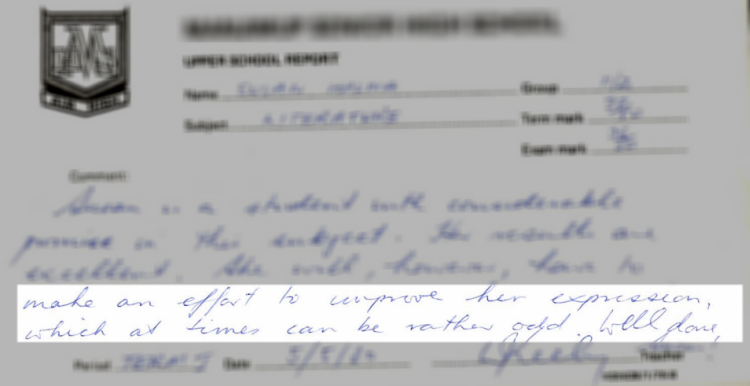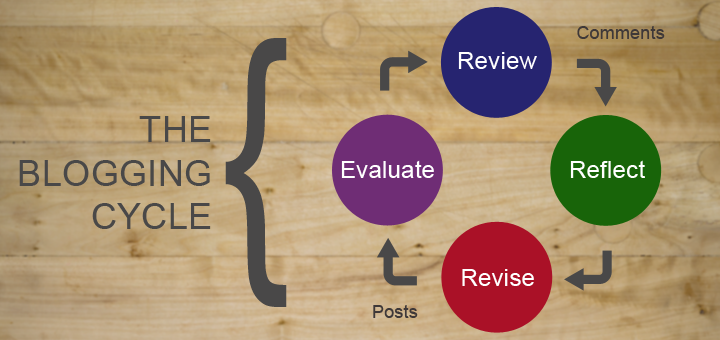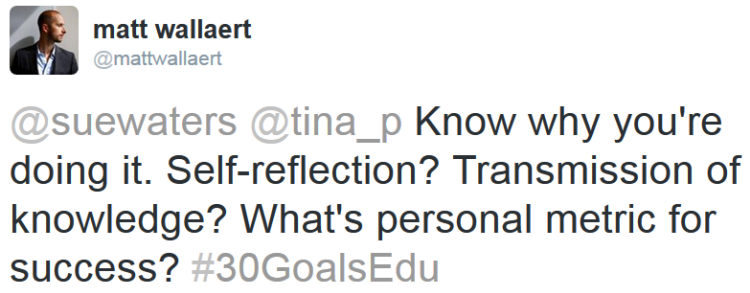Blogging has been both transformational and life-changing for me. As a result of blogging, I’ve changed how I learn, and I’ve helped others make a difference in their life.
What’s even more incredible is that I’ve battled writing and processing language my entire life. While my English teacher and I would agree that my expression continues to be rather odd at times — blogging helped me become a better writer.
It’s not perfect — and continues to be a work in progress — but I can’t imagine either of us ever thought that one day I would be paid to write.

And yet my blogging story isn’t that unique. Blogging has made a difference in the lives of so many.
Which is why I’m often asked for advice by educators setting up their own personal or professional blog. I’ve written this post to provide helpful tips to get started blogging or to take your blog to the next level (it is also a companion post for the Reflect on a Blog presentation that I gave for 30 Goals Conference and you can watch the presentation here).
This post is also a good example of how blogging changed the way I learn. None of us are experts….it’s impossible for any of us to remember every key point to include — this post was crowdsourced from tips, ideas and questions shared by my network on Twitter, Voxer and Facebook. Hopefully it highlights the importance of connected social learning. Thanks everyone who helped!
Why Blog?
When educators say ‘Why should I blog?, ‘Why should I blog with my students?’ or ‘How do I find time to blog?’ I understand. It took a year to understand why I should blog after being shown a blog (2006) and after starting my own blog (2007). Prior to starting my own blog, I shared my learning via podcasts and wikis; it wasn’t until I reached the point where I wanted to reflect on my learning that I started blogging.
For me it was a combination of not understanding, 1) what is a blog, and 2) the importance of reflection, sharing, connected learning and learning as part of a community.
Watch the following video if you’re struggling with What is a blog? This is a also a great video to share with students as it includes explanations of key blogging vocabulary.
The importance of reflection, sharing, connected learning and learning as part of a community takes time. It isn’t something you’ll necessarily appreciate immediately.
For those times you feel like giving up because you assume that no one cares what you’re writing, or you don’t feel like it is making a difference, remember Kevin Jarrett’s advice.

And reflect on Matt Wallaert’s tips.
Each of us have our own reasons why we blog and you can check out examples of personal educator blogs here. Having a clear understanding of why you blog and what you are trying to achieve really helps as you develop your blog.
Reasons why I blog are:
- Reflect and share my learning
- Help others
My personal metrics are:
- Did reflecting and sharing help my learning?
- Did it help others?
My advice for new bloggers is to avoid focusing too much on metrics such as visitors (number of visits to your blog), shares (number of times your posts are shared on social media) and comments (how many people comment on your posts).
Blog to satisfy your own personal needs, don’t worry too much about writing for an audience (it can stifle some new bloggers), and as Steve Wheeler says, above all, be passionate about what you blog.
What you need to know about blogging
It’s an easy trap to focus too much on publishing posts while failing to appreciate that reading other people’s posts and commenting on posts are a very important part of the learning process as a blogger.
Blogging is a constant cycle of:
- Evaluate
- Review
- Reflect
- Revise
The idea of reflective blogging is you’re evaluating, reviewing, reflecting, revising while reading other people’s posts, commenting on their posts, writing your own posts and commenting back on comments made by others on your own blog.
By following this process you’re learning at a deeper level and differently from how you’ve learnt previously; and you’re doing it as part of a community.
Simply put — Reflective blogging is about connecting with others!

Watch this video by Steve Wheeler on 3 Things you should know about blogging!
What do you blog about?
So what do you publish as posts on your blog? Pretty much anything you want to share you’ll publish as a post. Your reflections, what you’ve learned, how-to’s and cool information — there’s so much you can share!
Don’t wait to get started. Everything doesn’t need to be perfect to start sharing with the World. The key is to take the first steps!
Your posts don’t have to be perfect– blogging is a work in progress!
What is Obvious to you is amazing to others. Don’t assume others know what you know. There is always someone who will be grateful of what you shared — even if they don’t necessarily tell you.
Remember it is your personal blog
Let the reasons why you blog guide your decisions as to what you blog about. Blogging on specific topic areas can be better for building audience but may not necessarily achieve your personal metric of success if an important of your reflective learning involves blogging about your passions.
Learning by blogging: My Gardening Adventures on my personal blog is a good example of my needs to have my own space where I publish posts both on topic and off topic.
One of the best advice given by Kathryn Greenhill when I first started blogging was making decisions on what you’ll blog on and what you won’t.
In Kathryn’s Drawing the Veil post she explains “my yardstick is not about individuals, but about the group to which they belong. When I want to mention what someone else said or did, I think:
“If I write about workmate x, will my other workmates think I am looking at them as blog fodder too? If I mention the cute action by one of my kids’ friends, even with the parents’ permission, what does that do to the trust relationship with other parents ?”
Also check if there are any policy or guidelines that you need to follow as part of your employment conditions.
Which platform?
There’s a wide range of blogging platforms you can use including Edublogs, WordPress, Blogger and Weebly.
It’s better to think long term rather than short term.
How?
- Choose a platform that allows you to use your own domain name. Your own domain helps build your brand while also allowing you to seamlessly move your blog to another service if you ever decide to change. My domain is suewaters.com (here’s instructions on how I mapped my domain).
- Choose a platform with a wide range of features. While I am biased, there is a reason why most professional bloggers use WordPress powered blogs. A WordPress powered blog hosted on Edublogs, WordPress.com or your own self-hosted WordPress blog is the better option.
Refer to The State of Educational blogging in 2014 for more information on which platforms are used by educators and why.
Getting Started
Our personal blogging series is a good started place. It guides you step by step through the process of setting up your own personal educator blog. Each step provides examples of personal educator blogs so you can check out how they are used by other educators.
You’ll find all the important tips for choosing your URL, blog title, theme and widgets in our personal blogging series.
Refer our class and student blogging series if you want to set up a class blog.
Blogging routine
Some people find that having a blogging routine helps them get started.
While I’m often asked how frequently you should publish posts, it is better to choose a blogging routine that suits your needs and what you are trying to achieve.
As a general rule writing a post 1-2 times a week is a good option for most educators.
Choosing which days you publish your posts can also help. You might decide to publish posts on Tuesdays and Thursdays but write them at the same time and schedule them to publish on those days.
Publishing posts
Here’s some post ideas:
- Work through the 30 Goals and post your reflections on your blog.
- Check out this collaborative Google Doc of writing prompts for Teachers and Preservice teachers for ideas of what to blog about.
- Participate in a challenge, MOOC or community activity. #YourEduStory is an example of a community that share their posts once week on Twitter using their blogging prompts.
Don’t worry too much about post length. There is no right or wrong answer as to how long or short a post should be. But these tips will help you write better posts.
Remember blogging isn’t about writing. It’s about connecting, reflecting and sharing. Mix it up with video, audio and embedding cool tools into your posts.
Watch Seth Godin and Tom Peters video on blogging.
Find an audience
Yes I did say don’t worry too much writing for audience however as you develop your blog you will want to increase your blog readership and subscribers. Readers can be a motivator when you first get started and comments are an important part of the reflective learning process.
Commenting
An important part of connecting with other bloggers is making time to read other educators’ posts and commenting on their posts. Make sure you select the ‘Notify me of followup comments via e-mail‘ when leaving comments on other blogs posts so you are alerted of any follow up comments and reply back to any responses quickly (if appropriate).
Also remember to respond back to comments on your own posts. It shows you value readers’ comments. Some educators also send an email reply to their commenters. This ensures the commenter receives your response and provides a more personalize response — which helps build personalized connections with others.
You’ll find tips for making reading and commenting time efficient here.
Social networks
Mobile devices and social networks have changed how we source the content we read. It’s also impacted on how we connect with others.
We’re far more social now and more likely to use social network sites like Twitter, Facebook and Google+ as a buffet. Consuming whatever we want at our leisure by selecting posts from links shared by our networks.
To increase our chances of posts being read we need to:
- To be an active part of the edublogosphere and make time to social network with others via Twitter, Facebook or Google+.
- Add social share tools like AddThis Social Share to make it easier for others to share your posts.
Twitter is the key network used by educators and the primary location where most educators source links to posts to read.
If you aren’t using Twitter or don’t follow many educators on Twitter — now is the time to build up your Twitter network! You learn more about using Twitter here.
Communities
Participating in challenges, MOOCs or community activities are a great way of building your blog community.
#YourEduStory is an example of a community that share their posts once week on Twitter using their blogging prompts.
That’s it!
For more tips and advice check out our personal blogging series or watch on Reflect on a Blog presentation that I gave for 30 Goals Conference below.
Please leave any and all questions or important advice I’ve missed below!
Happy blogging!


I started blogging because I implemented blogging in my classroom. At the time, I was an ESL teacher and it struck me that if my students who were barely proficient in English could blog, I certainly could…so I did. Your words echo my thoughts. Now as an instructional coach, I hope to spread the message at my school.
That’s so great to hear you followed your students, Anabel! I bet that would have been very powerful for them to see you blogging alongside them. Good luck spreading the message amongst your colleagues.
Hi Sue, I really enjoyed reading this post and found your use of videos stimulating and informative. It really breaks up the text. Another element of your post I liked was the twitter comments – big and bold for the reader to see. How did you do this? I would love to maybe incorporate this technique into my blog if you do not mind sharing.
Thank you for sharing your blog with me,
Katie Rebecca
Presently taking a class on blogging and I have found this to be an incredible resource from top to bottom. Thank you so much for sharing your thoughtfully reflective work and tips.
I love blogging and enjoy teaching it as much.
Hi Sue,
First off, amazing article! I just started blogging and am trying to learn from others who have much more experience than me. To be honest, writing is still pretty tough but it’s one of the most valuable life skills to have. Because with writing, you can easily share your ideas with others.
Thank you for sharing your idea of reflective blogging (never heard of it until 5 minutes ago haha)! I realized commenting is just as important as blogging, which is why I linked your idea on my blog post: http://zlass.com/blog/modern-trends-for-starting-a-blog-tips/. It’s about useful tips for those starting a blog, considering the modern trends of blogging now. I believe it’ll also provide great value for your readers. If you like, mind if you share my link too? I’d greatly appreciate it, but if not, that’s okay too.
Otherwise, keep up with the phenomenal work!
Tiffany
Jennifer – voice is an interesting topic and something I decided to not cover during this session. During one of the sessions on blogging for pre-service teachers we discussed voice and some of the new bloggers then started to worry too much about having their own unique voice.
Getting comments is a lot harder now than when I first started blogging while sharing posts is easier.
Darren – hope summer is going well for you? I prefer metrics that are about why you are blogging rather than stats. You also need to have a good understanding of the different types of stats to be able to intepret what they mean and most new bloggers don’t.
Rosa – is the blog part of an educational program or to share your thoughts on human rights?
Teresa – Glad my post helped! Can’t remember which year I originally presented the blogging cycle graphic. This is a newer look of the original graphic that one of my work colleagues organised for me. Blogging for myself really helped when I started out and the rest did follow!
Sue,
Thanks for the thorough and insightful post—I especially appreciate the Blogging Cycle graphic and the emphasis on blogging for yourself, and the rest will follow!
After this reading, I will love to open a blog and manage this with issues regarding with human rights, thank you for all the information indicated here, I am thinking what platform will be adequate for that..
Thank you so much,
Sincerely,
Rosa Lila
Great reflection, as always, Sue! I love the two metrics you describe, and have used those metrics myself.
Thank you! I have been blogging for a few years now and I do it for many of the reasons you list here. I feel that I am still wading through things like finding my audience and my voice, but like you, I love to write, so I think if I just keep writing it will work itself out. I also appreciate you talking about comments; I do wish that more people would take the time to do that. All writers need feedback! Recently, a few teachers with whom I work have asked about how to get started and I will certainly direct them here.